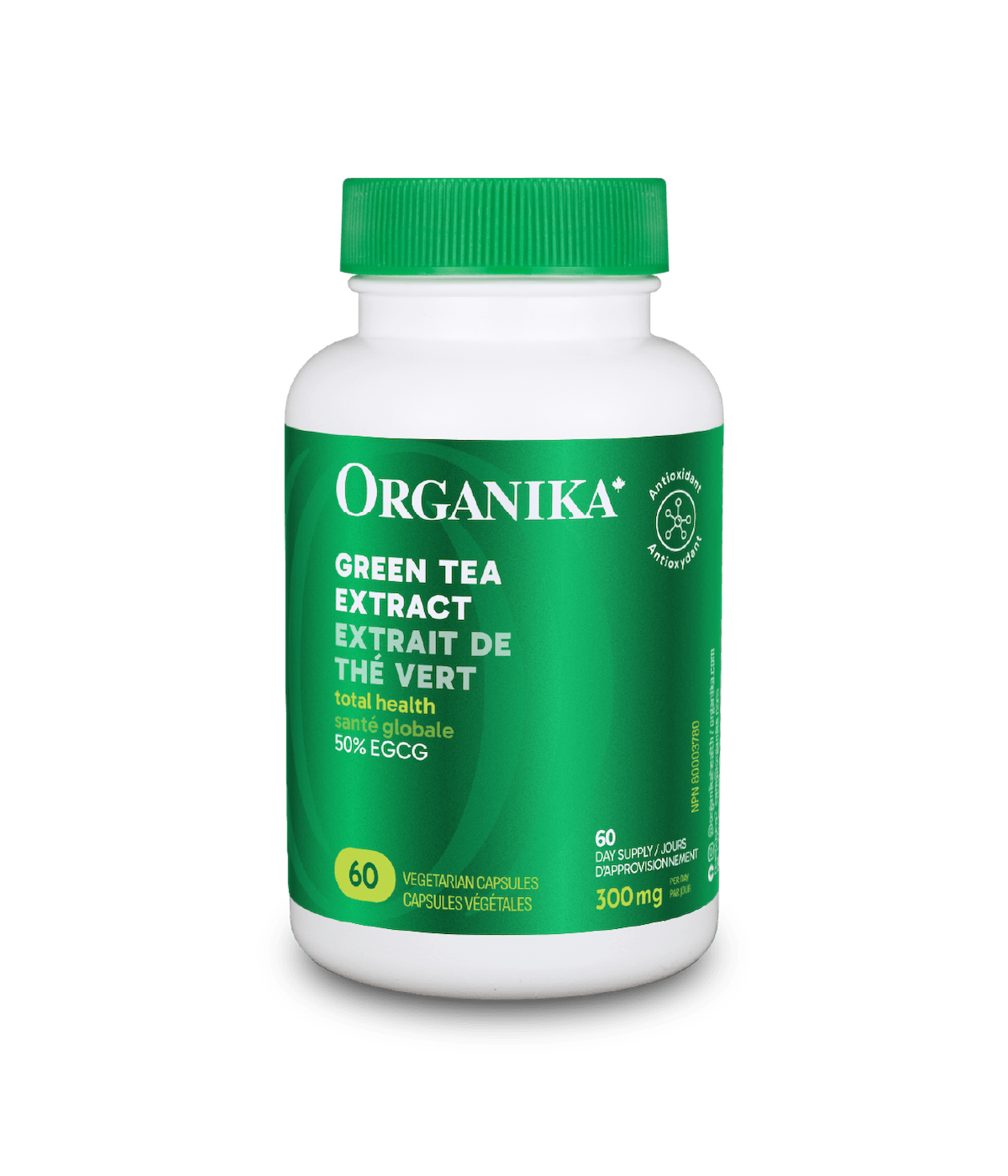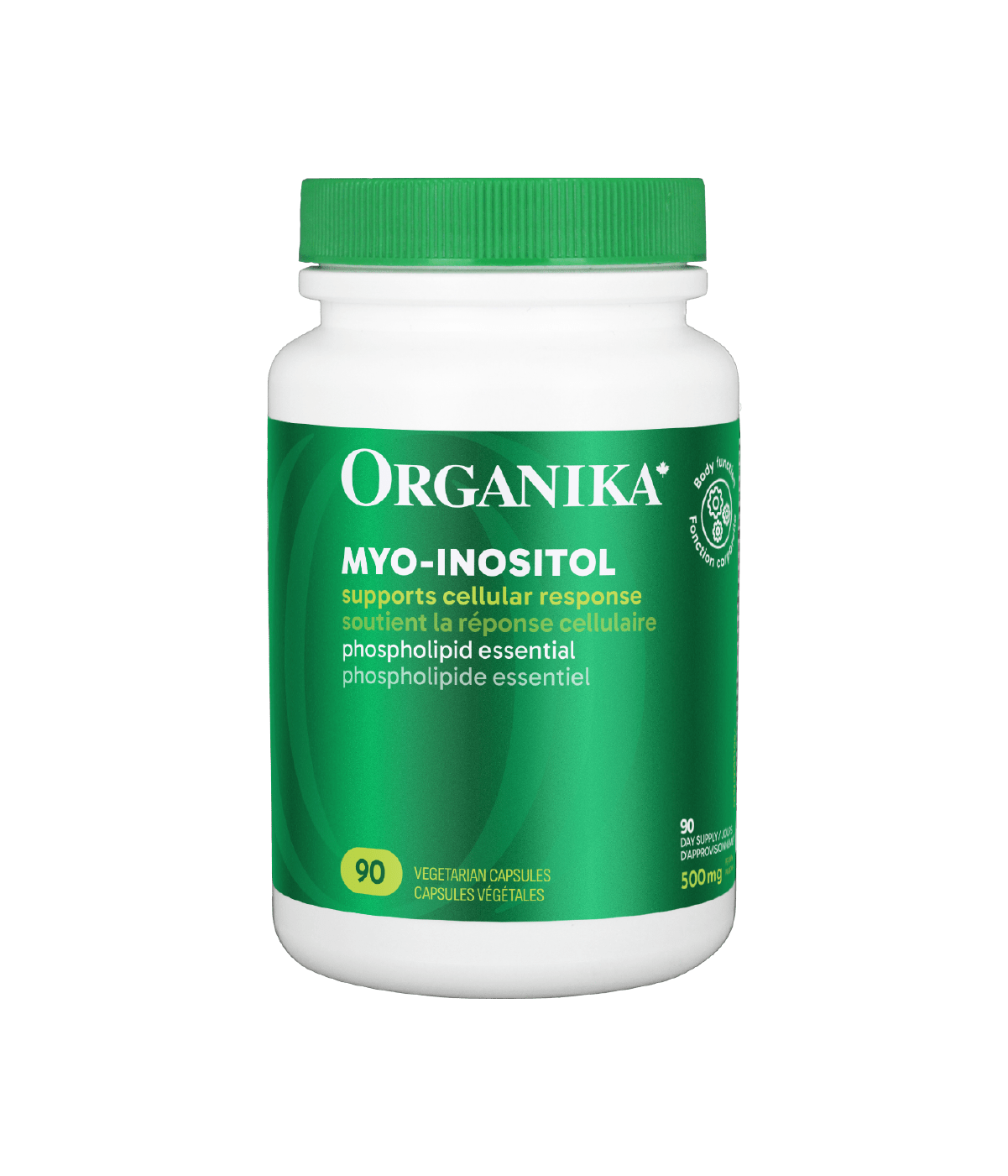
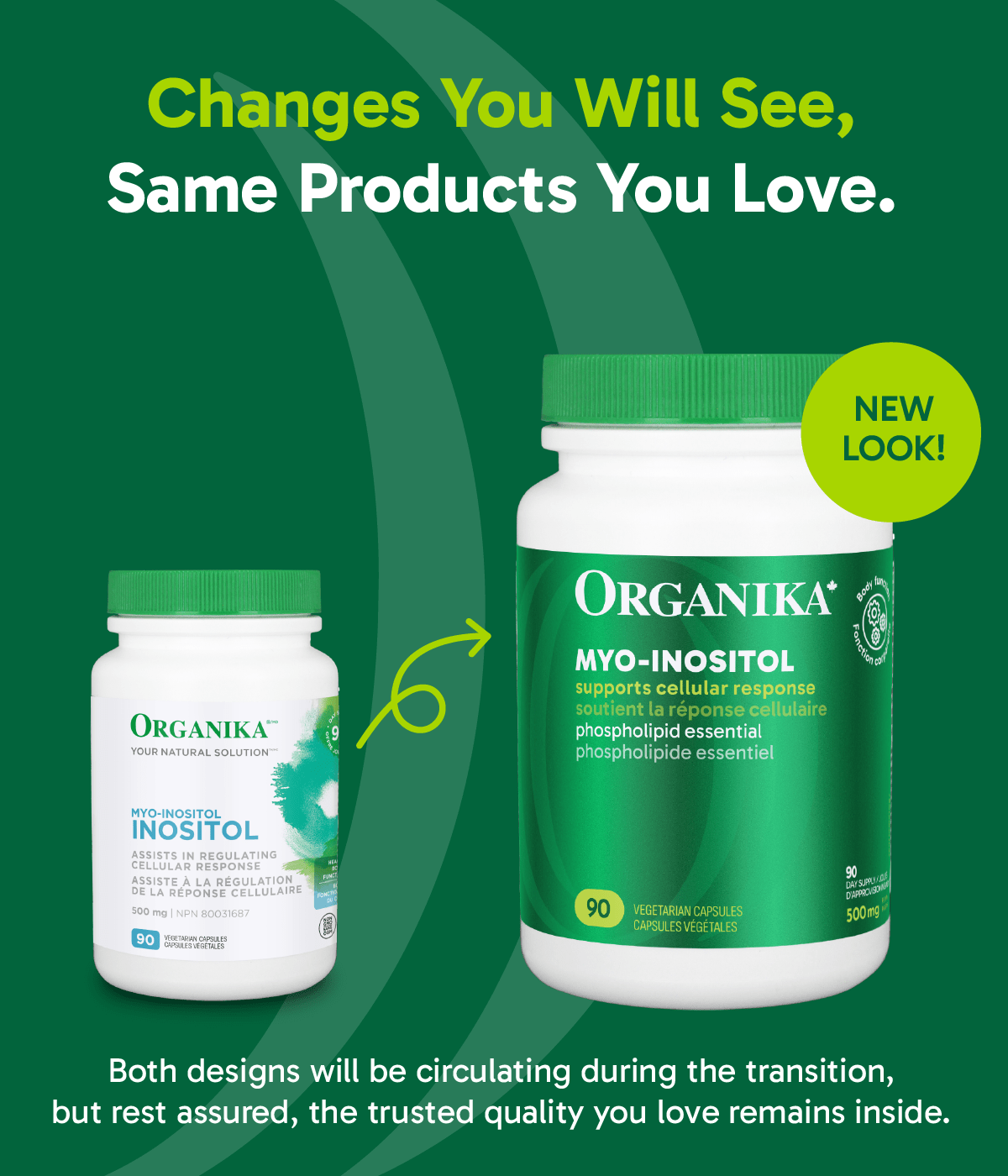
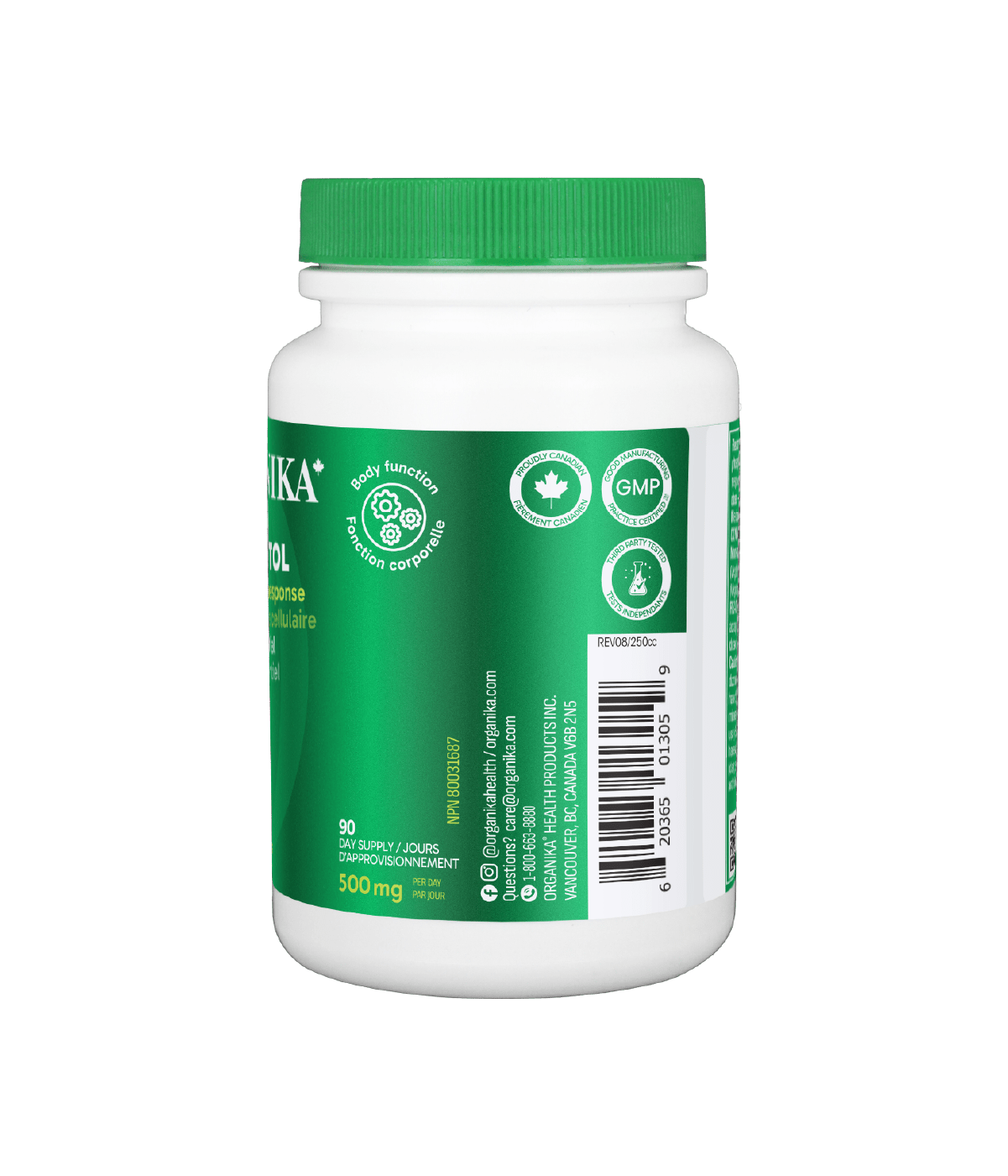
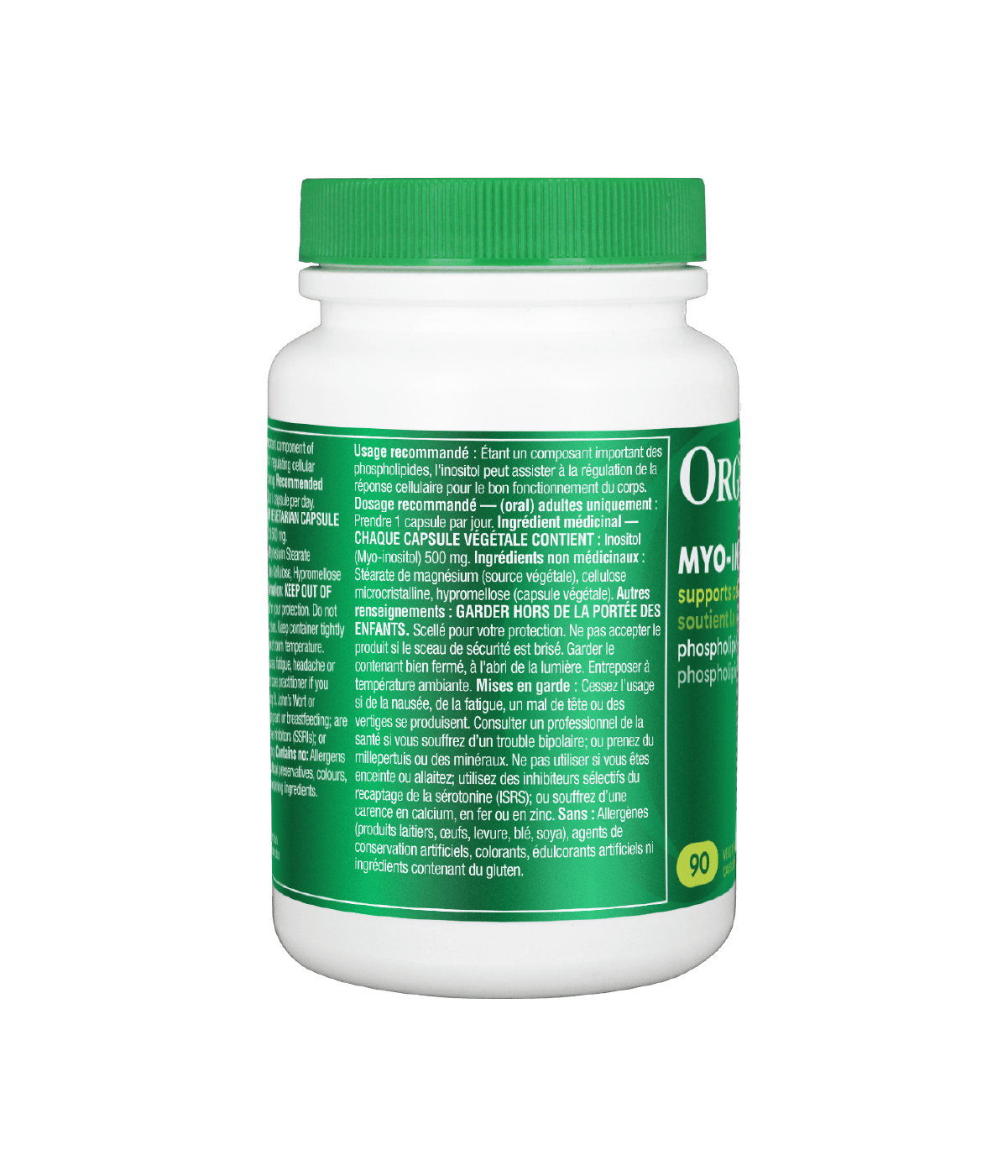
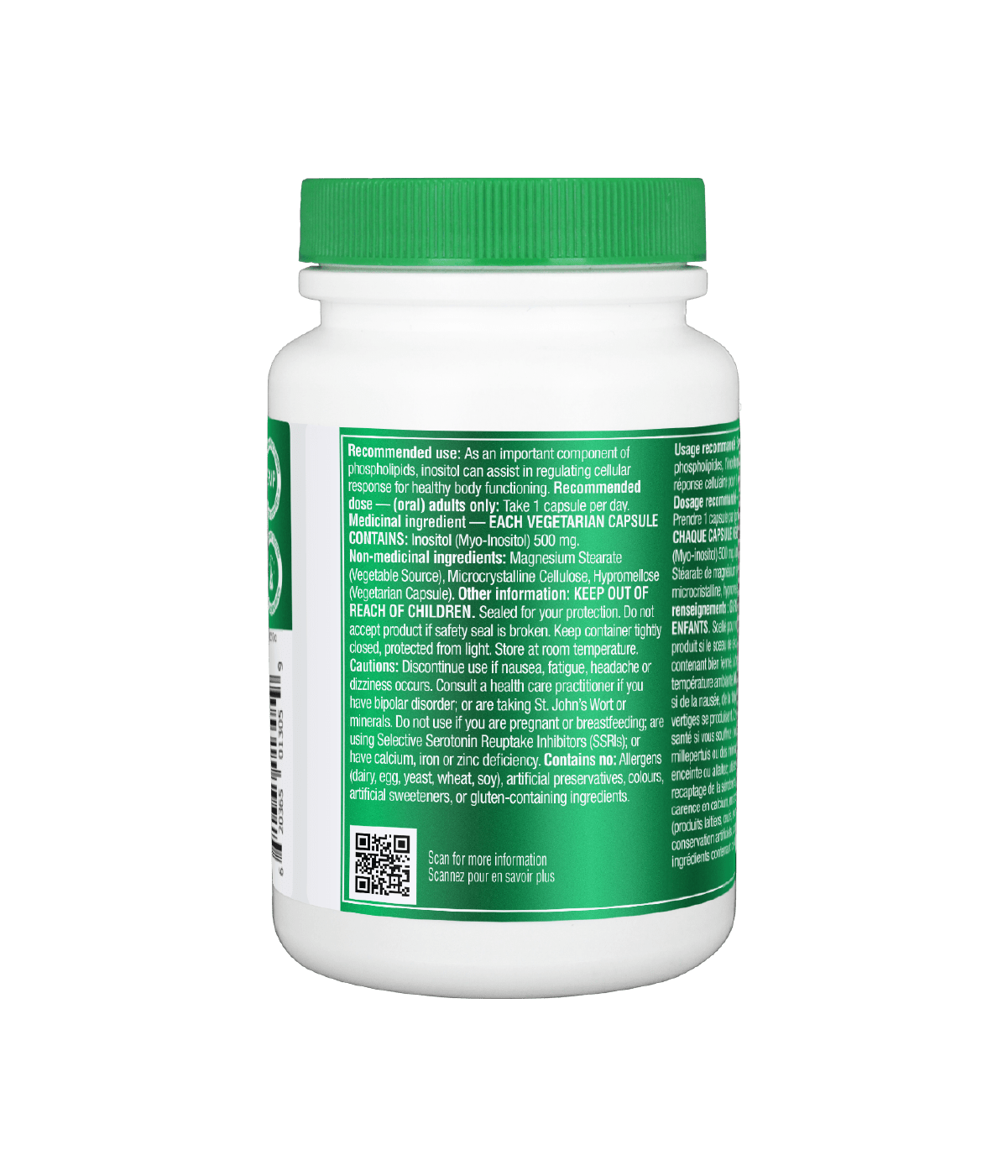
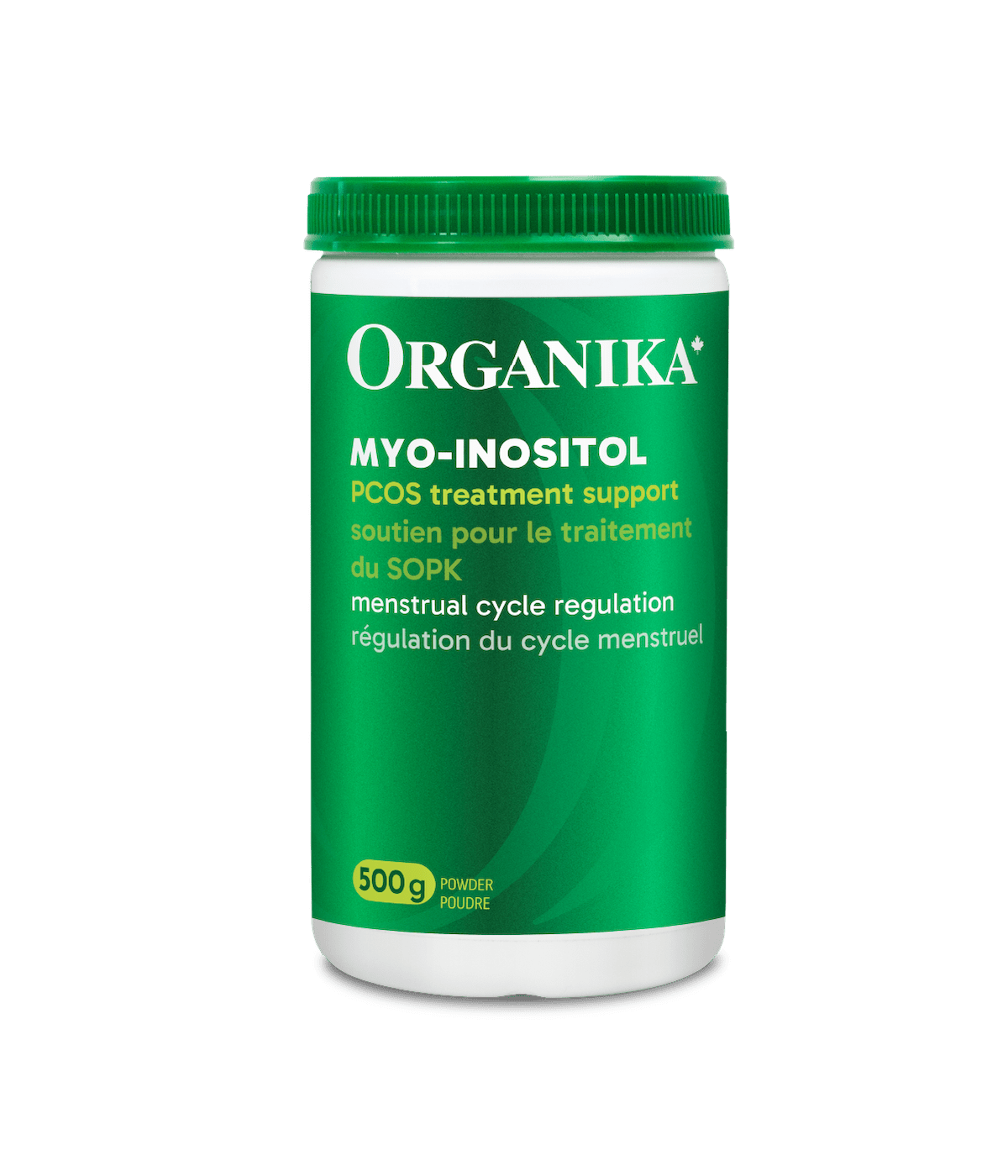
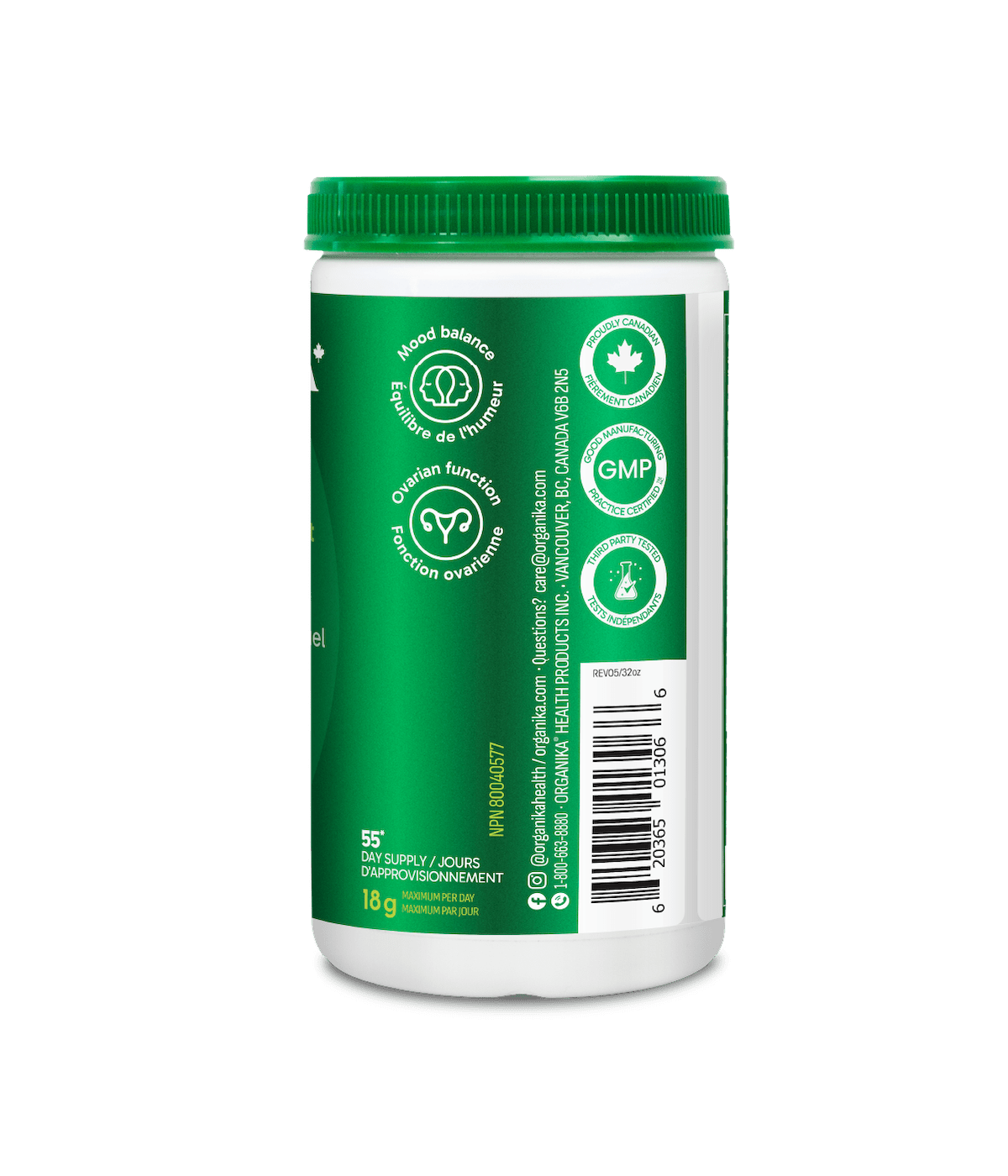
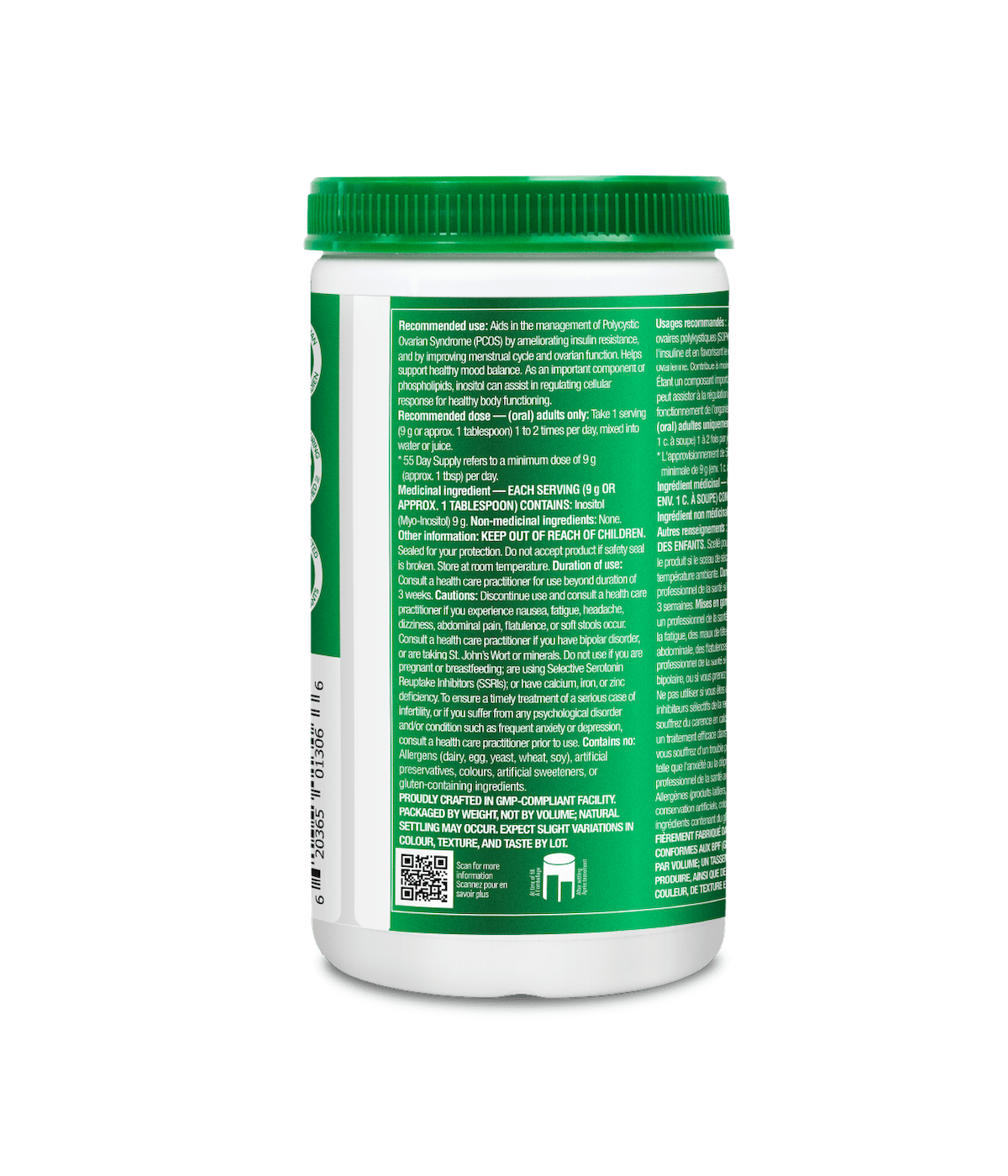
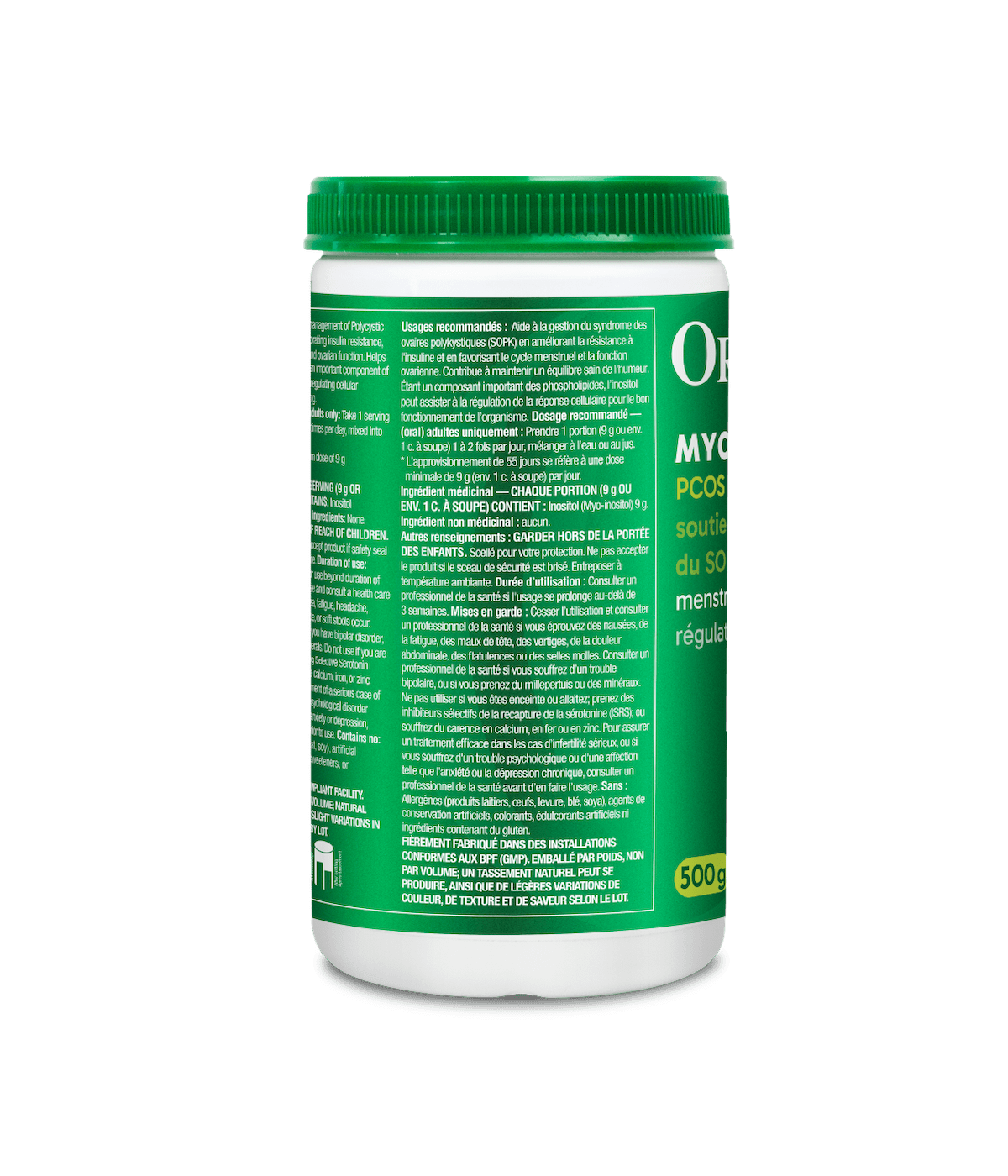




-
Is this right for you?

-


-


-

-

-

-

-

-

-

-

Inositol
Support for healthy hormone & mood balance, and ovarian function in females
- Supports a healthy mood balance
- Promotes ovarian function and supports reproductive health
- Helps regulate insulin sensitivity for metabolic and hormonal balance
- Promotes healthy cellular communication and response
Couldn't load pickup availability
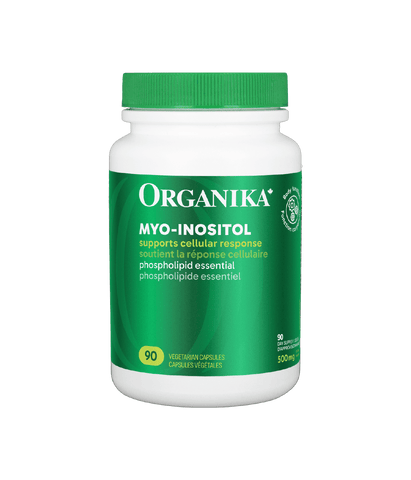
Notify Me When Available
Enter your email and we'll let you know as soon as this product is back
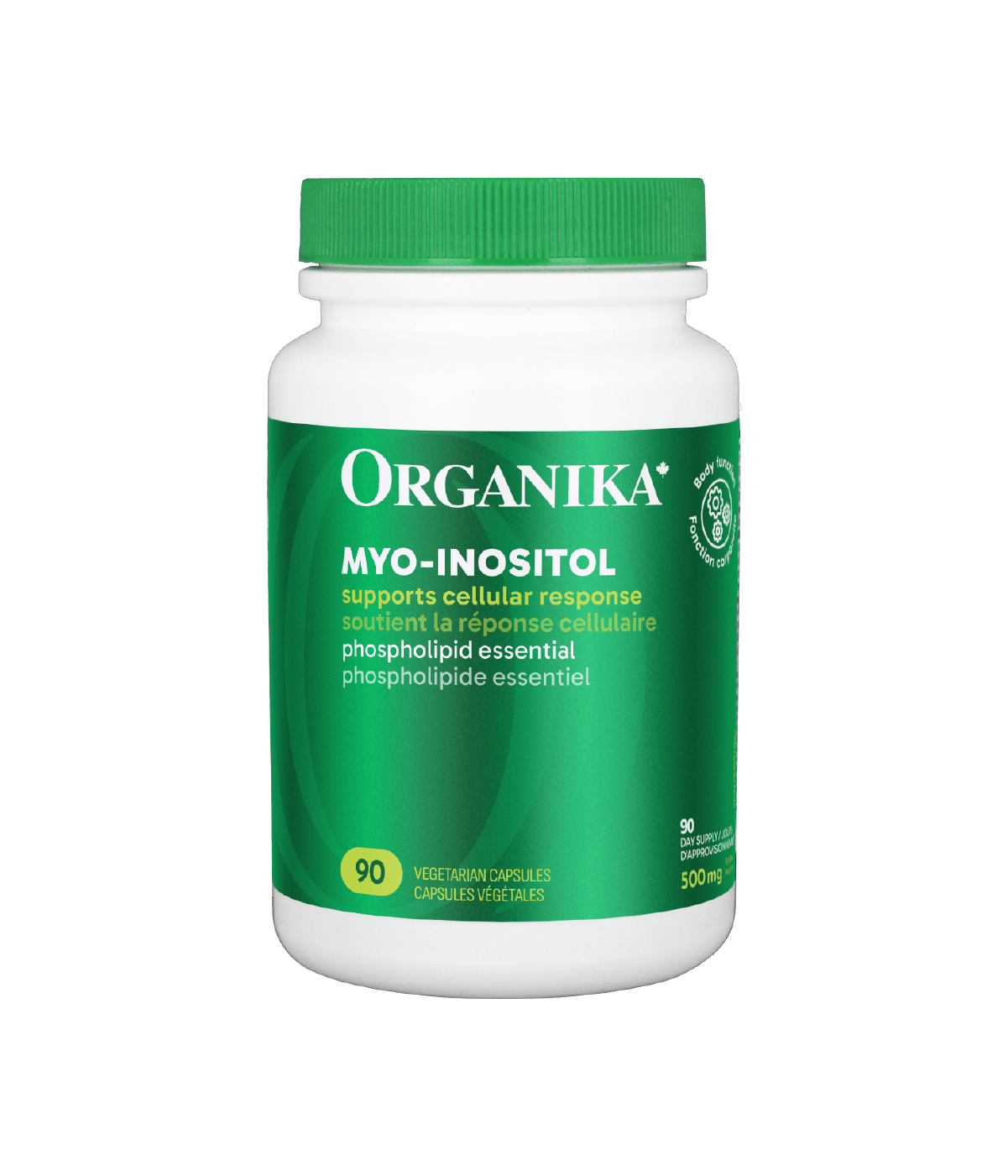
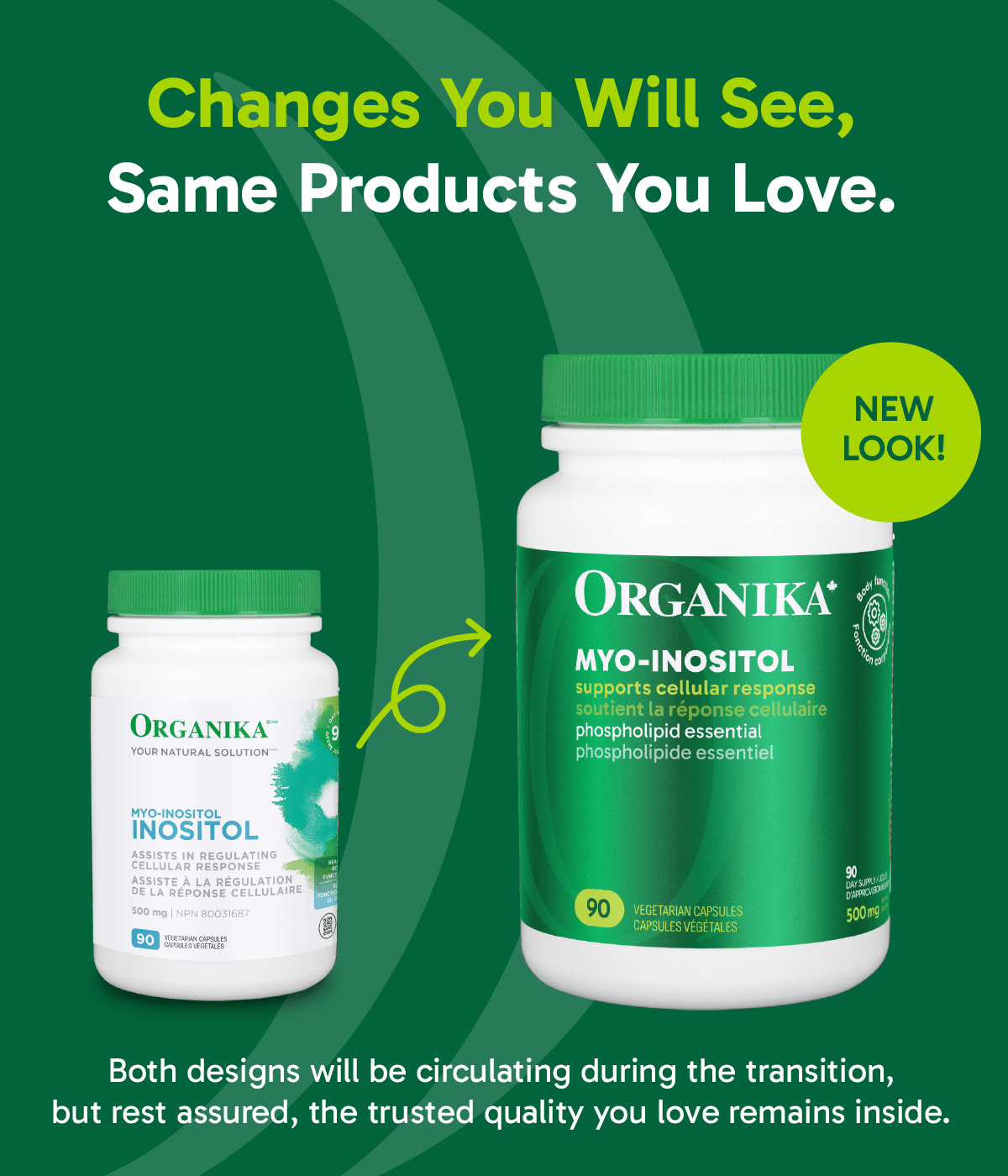
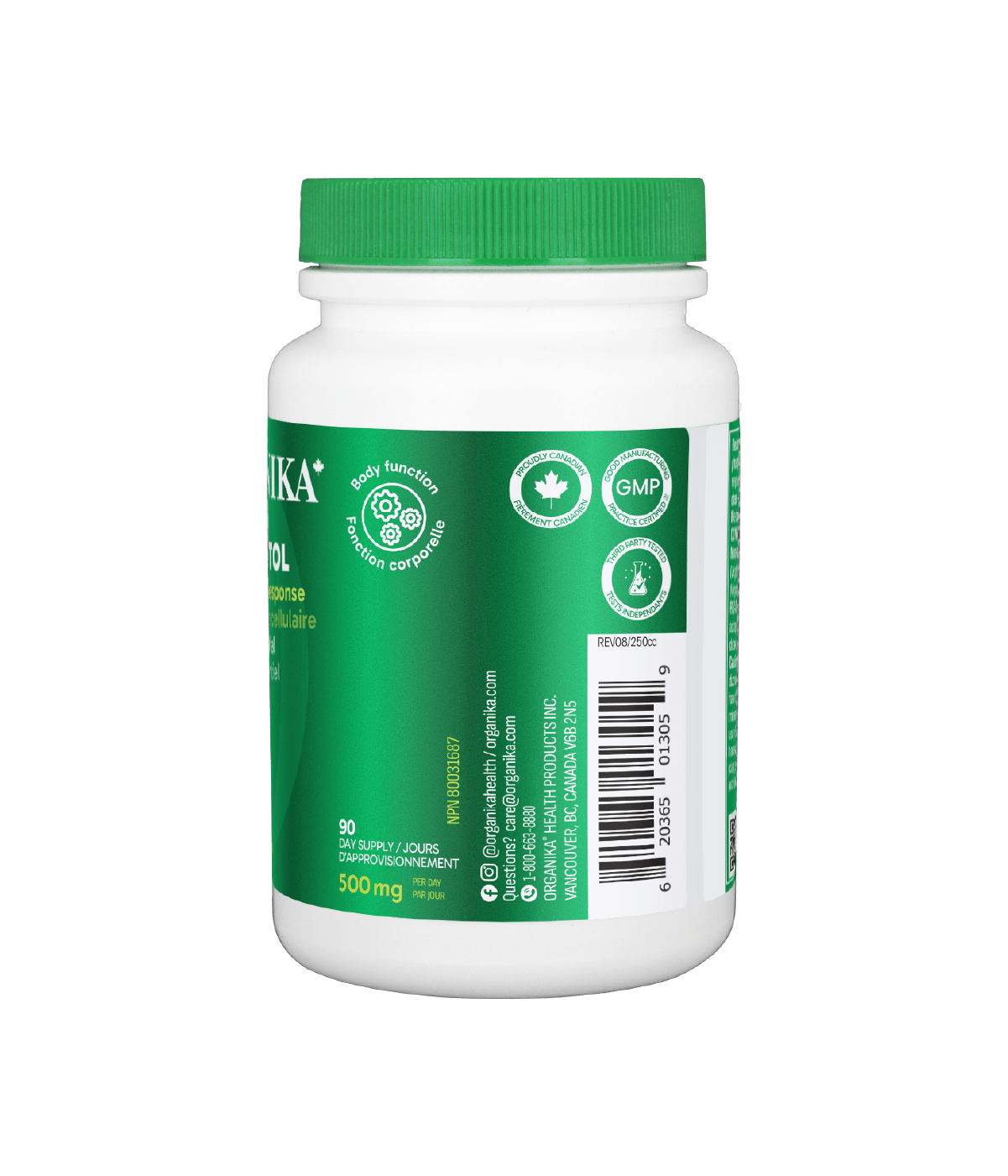
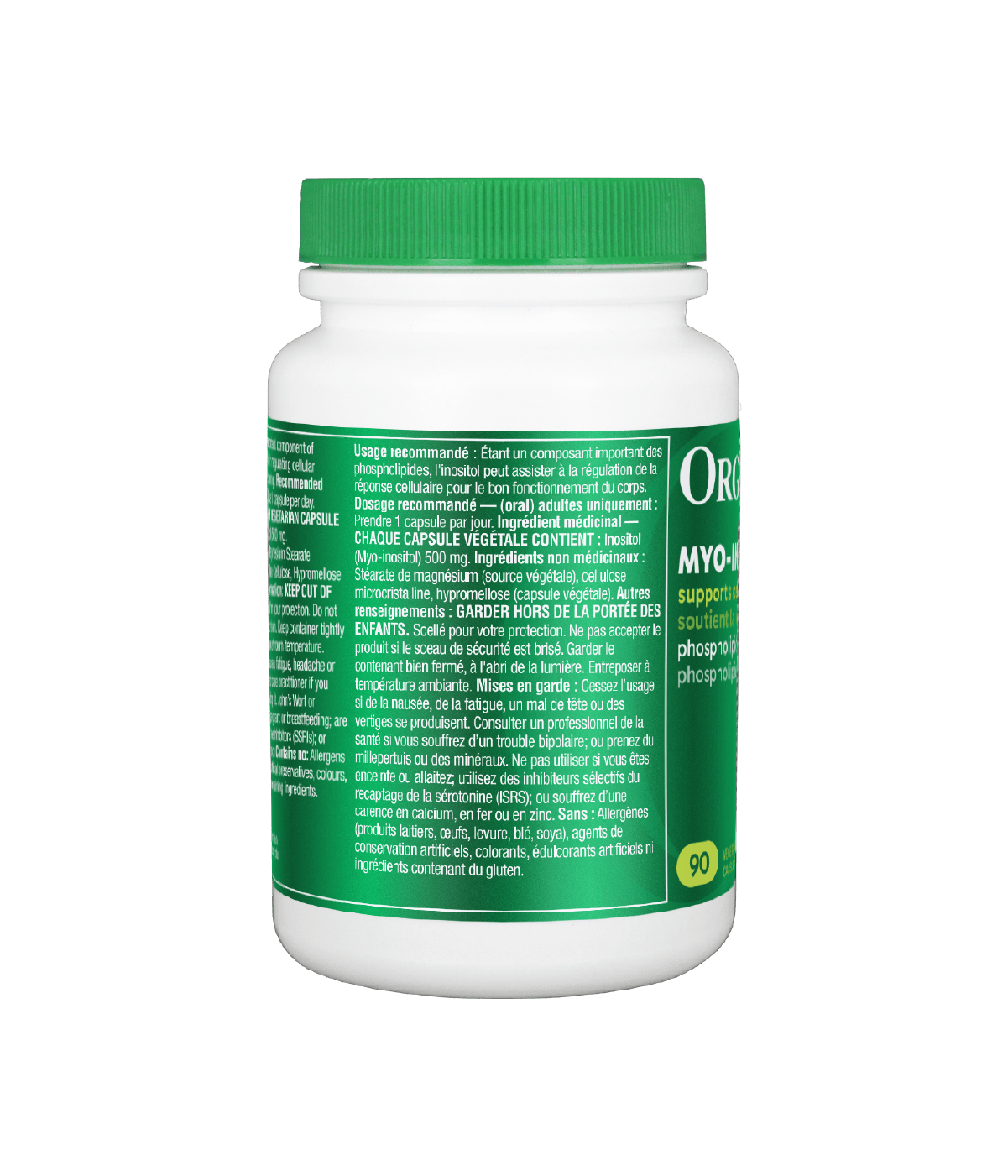
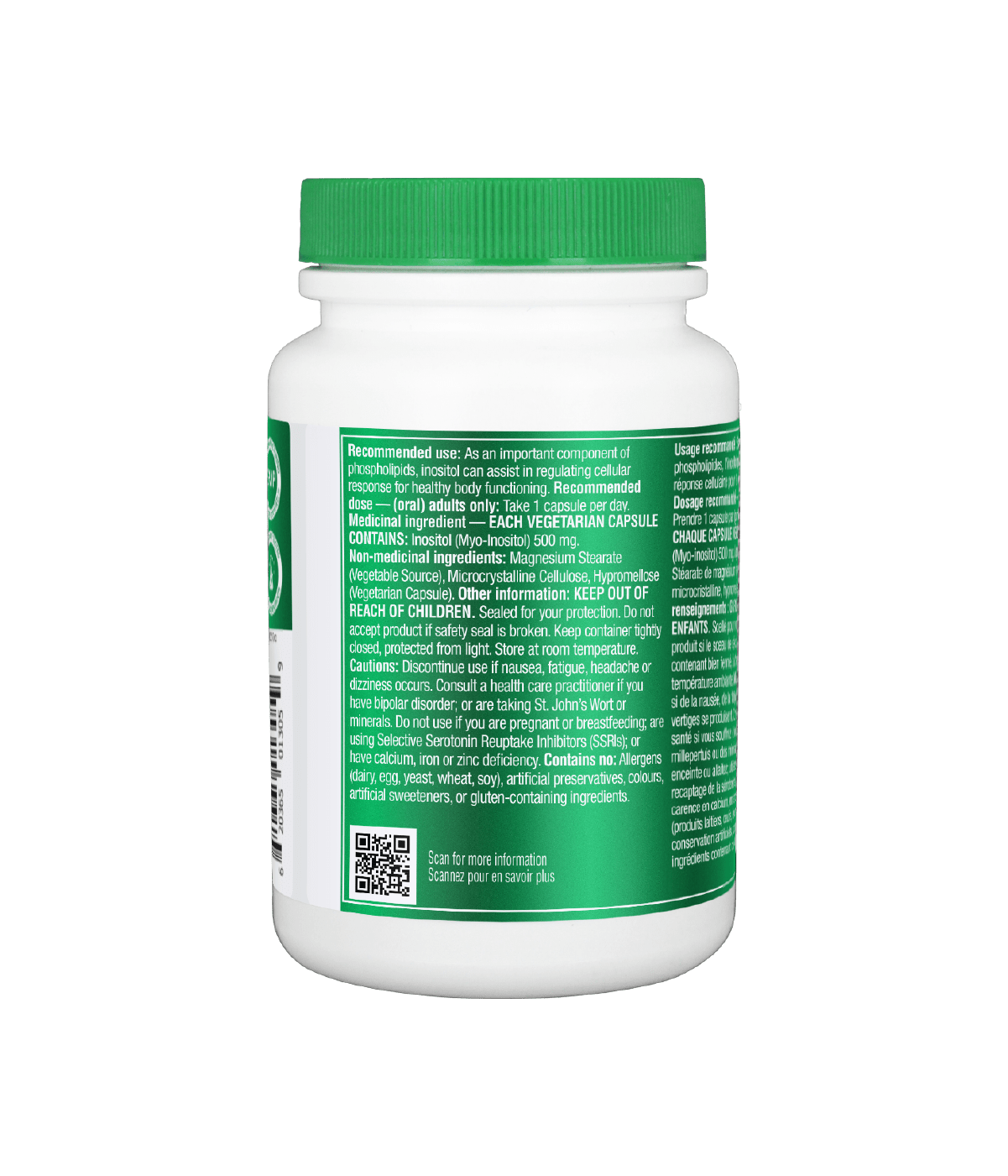
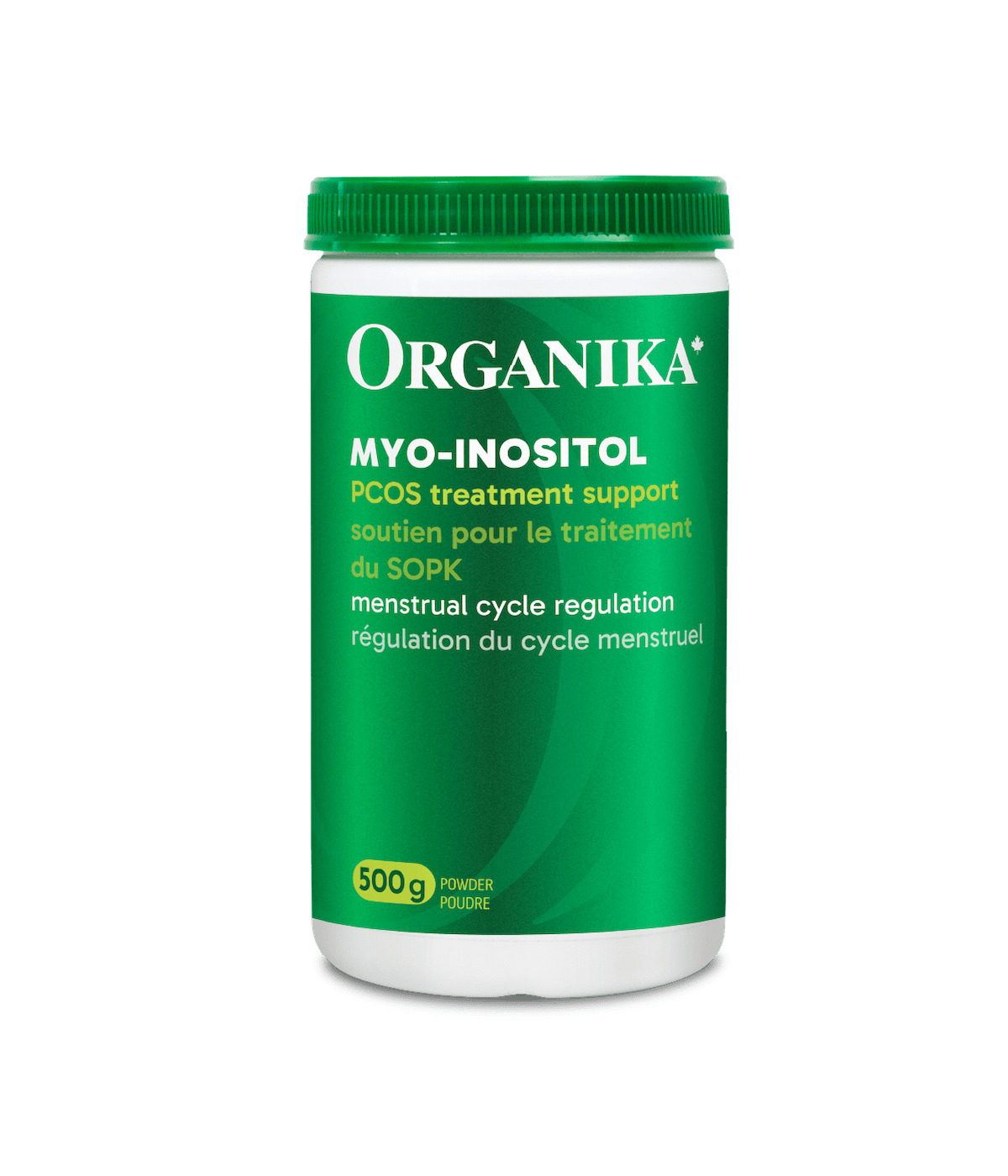
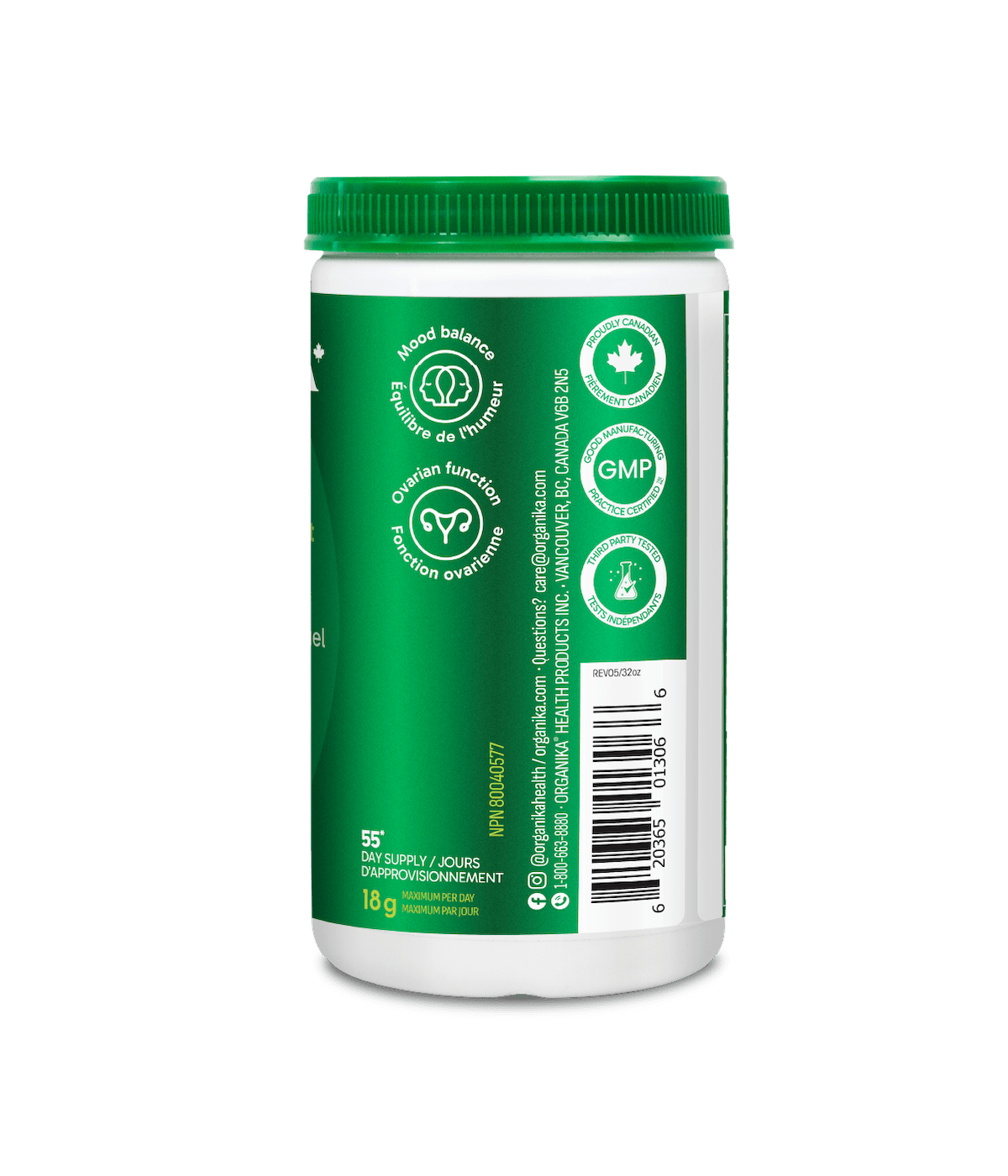
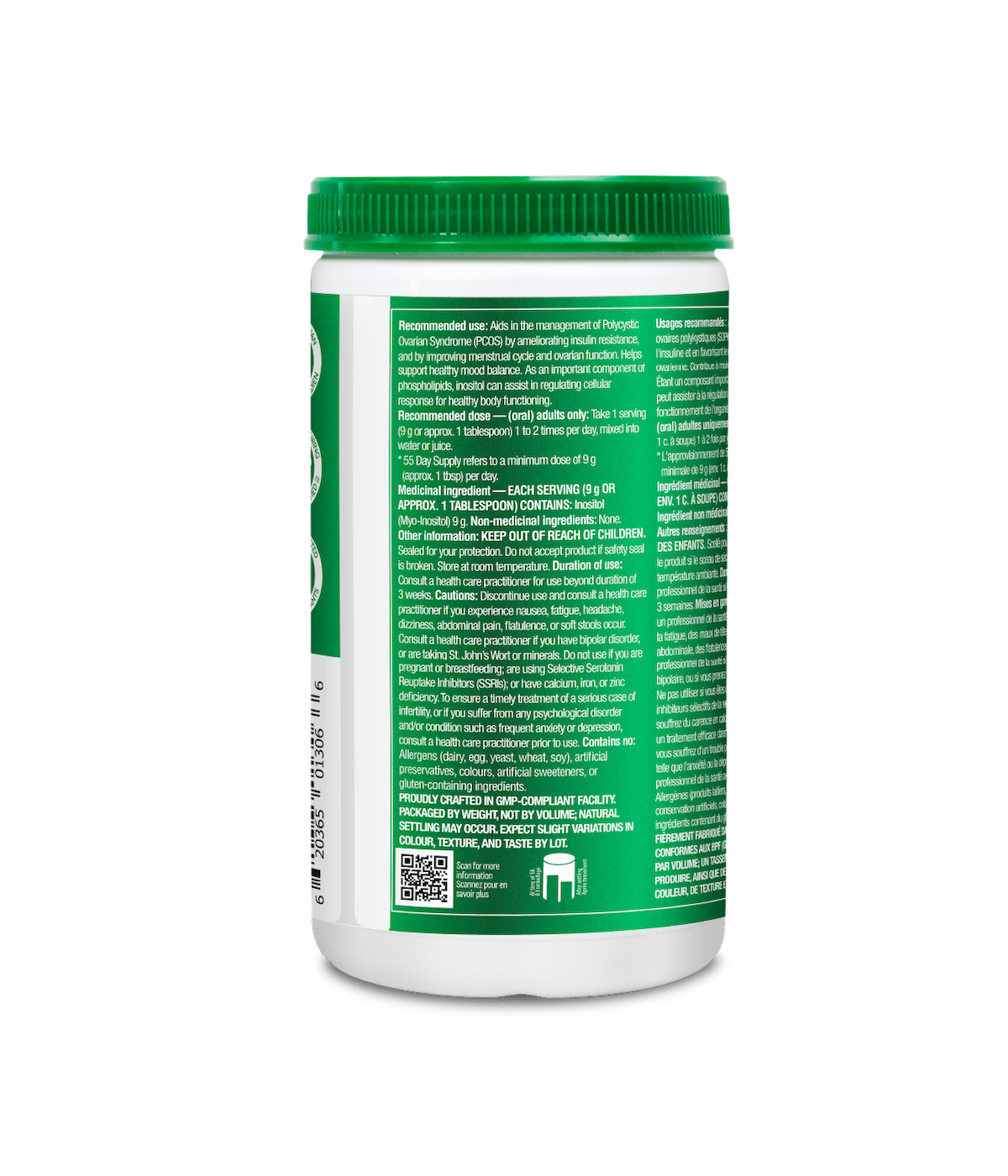
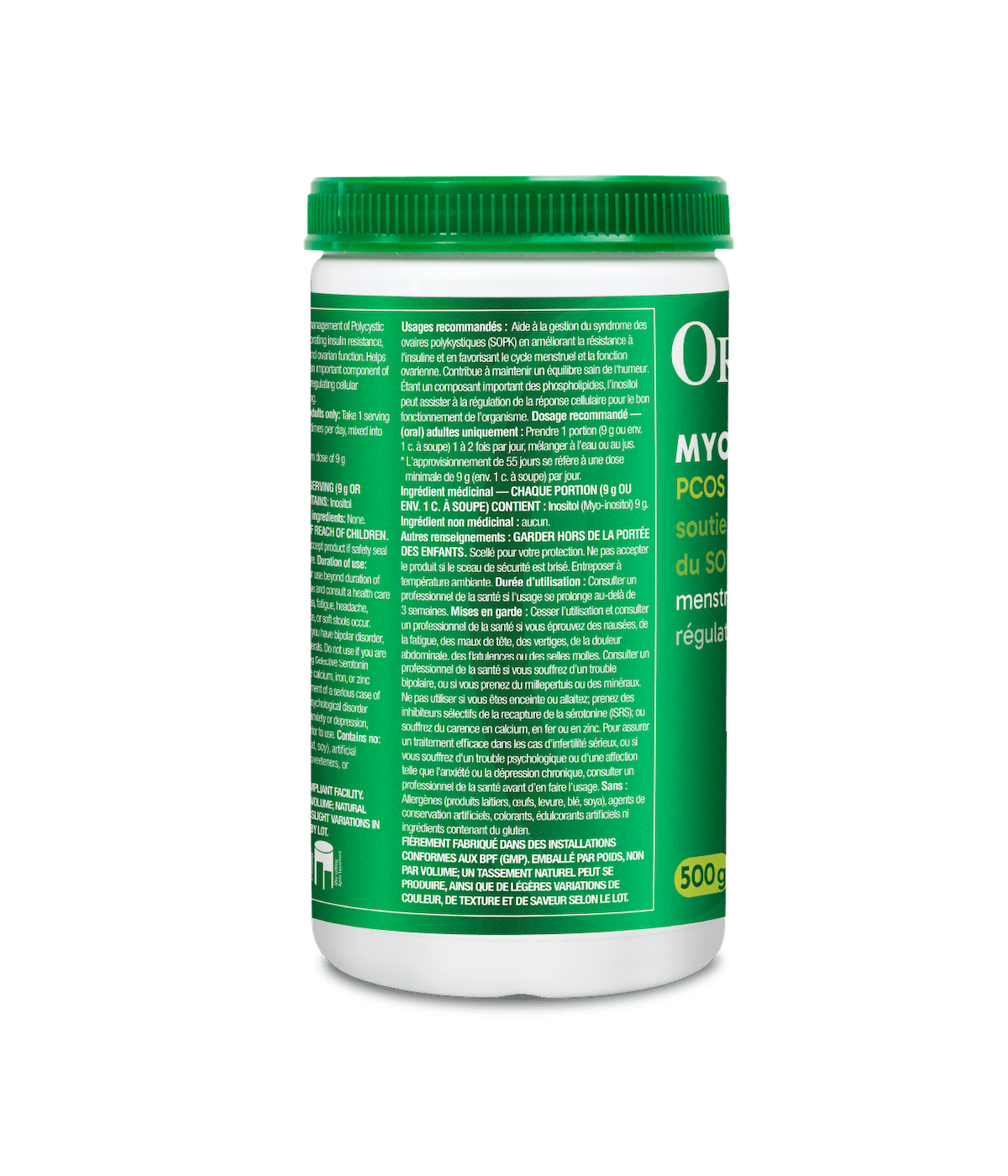









Supplement Facts
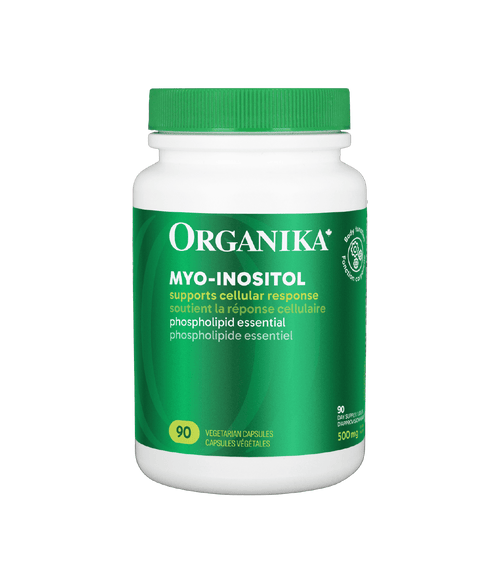
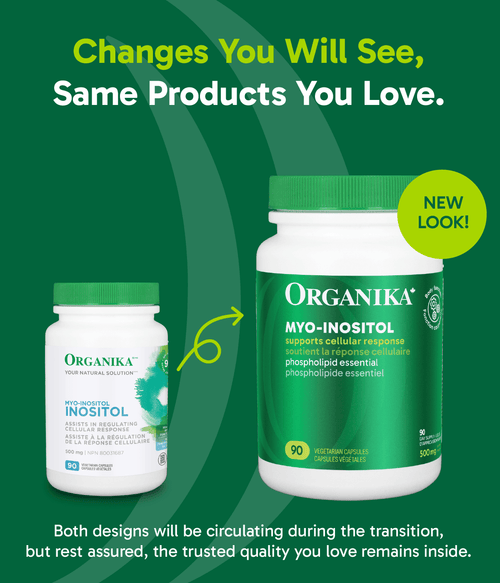
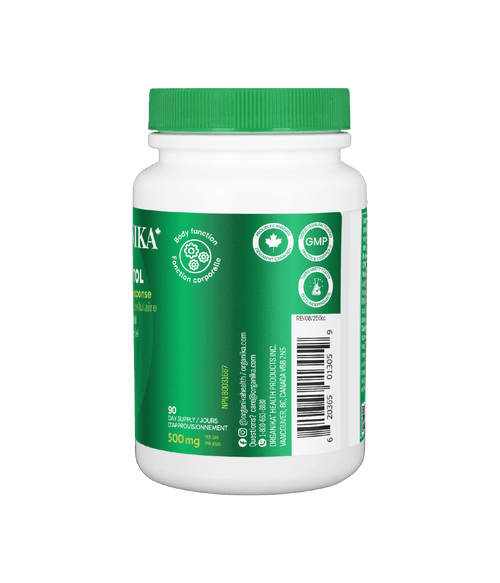
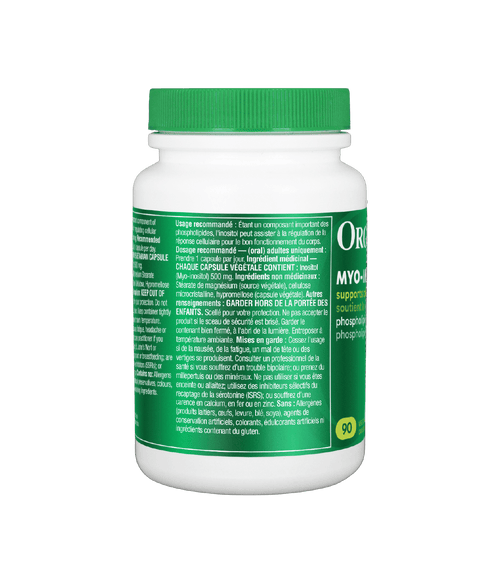
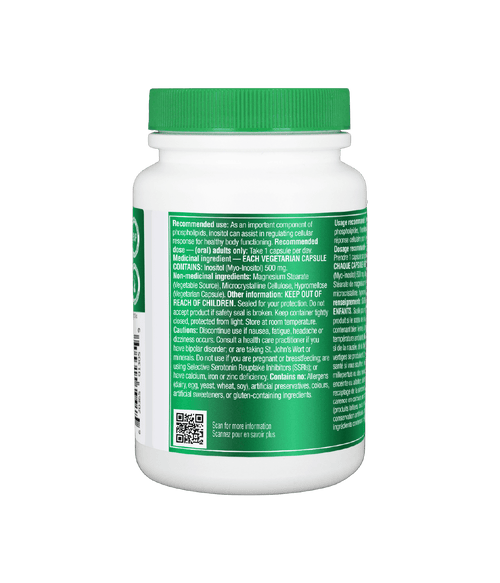
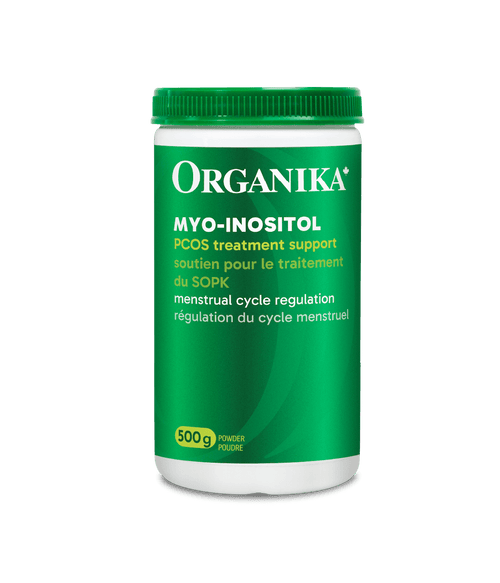
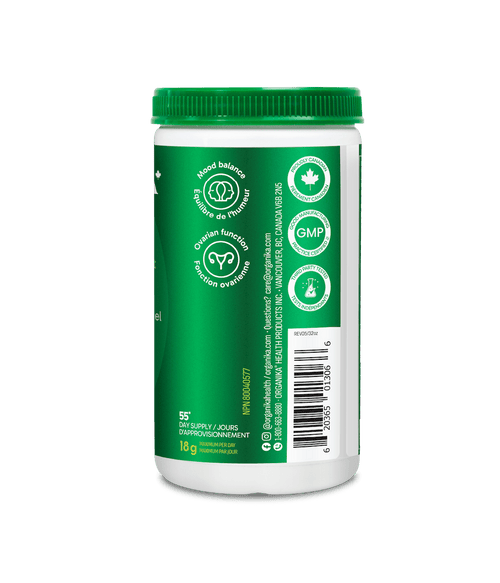
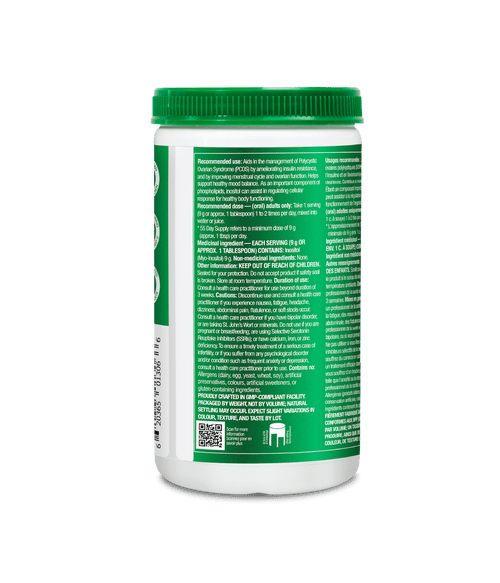
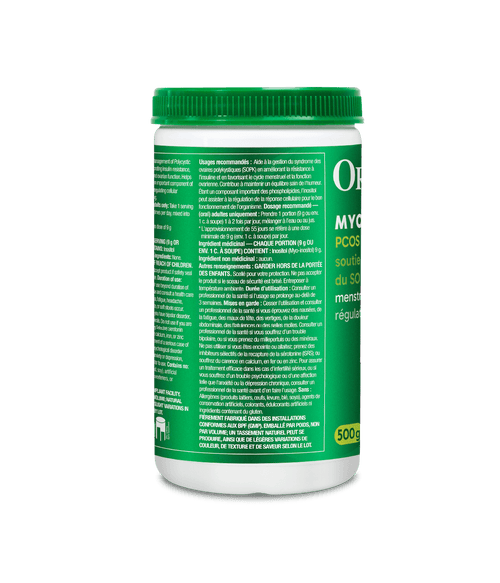
Ingredients & Nutrition
Inositol Capsules
MEDICINAL INGREDIENT - EACH VEGETARIAN CAPSULE CONTAINS: Inositol (Myo-Inositol) 500 mg.
NON-MEDICINAL INGREDIENTS: Magnesium Stearate (Non-GMO Vegetable Source), Microcrystalline Cellulose, Pullulan / Hypromellose (Vegetarian Capsule).
Inositol Powder
MEDICINAL INGREDIENT - EACH TABLESPOON CONTAINS: Inositol (Myo-Inositol) 9 g.
Inositol Capsules RECOMMENDED DOSE - (ORAL) ADULTS ONLY: Take 1 capsule per day. Cautions: Discontinue use if nausea, fatigue, headache or dizziness occurs. Consult a health care practitioner if you have bipolar disorder; or are taking St. Johnís Wort or minerals. Do not use if you are pregnant or breastfeeding; are using Selective Serotonin Reuptake Inhibitors (SSRIs); or have calcium, iron or zinc deficiency.
Inositol Powder RECOMMENDED DOSE - (ORAL) ADULTS ONLY: Take 1 levelled tablespoon (9 g) 1 to 2 times per day, mixed into water or juice.
Duration of Use: Consult a health care practitioner for use beyond duration of 3 weeks.
Cautions: Discontinue use and consult a health care practitioner if you experience nausea, fatigue, headache, dizziness, abdominal pain, flatulence or soft stools occur. Consult a health care practitioner if you have bipolar disorder, or are taking St. Johnís Wort or minerals. Do not use if you are pregnant or breastfeeding; are using Selective Serotonin Reuptake Inhibitors (SSRIs); or have calcium, iron or zinc deficiency.
Is This Right for You?
Are you looking to support hormonal balance, particularly with PCOS?
Do you want to improve insulin sensitivity and metabolic health?
Are you seeking natural support for reproductive wellness and fertility?
If you answered "yes" to any of the above, this product is right for you.

-
Helps regulate insulin sensitivity for metabolic and hormonal balance
-
Promotes healthy cellular communication and response
Ingredients & Nutrition
Recommend For
Are you looking to support hormonal balance, particularly with PCOS?
Do you want to improve insulin sensitivity and metabolic health?
Are you seeking natural support for reproductive wellness and fertility?
If you answered "yes" to any of the above, this product is right for you.
Sans gluten
Non-OGM
Compatible avec les végétariens
Inositol plays a vital role in hormonal regulation, supporting metabolic health and reproductive function to help you achieve balanced wellness


The Full Scoop

-
Helps regulate insulin sensitivity for metabolic and hormonal balance
-
Promotes healthy cellular communication and response
Inositol is the hero of cellular communication, helping cells, hormones, neurotransmitters and growth factors all stay in sync for smooth, healthy body function. It plays a crucial role in balancing water and electrolytes inside and outside your cells, supporting everything from insulin signalling, to fat metabolism and even gene expression.
For those navigating challenges like polycystic ovary syndrome (PCOS), inositol shines by improving insulin sensitivity, which can help regulate the menstrual cycle, reduce excess androgens and boost ovarian health. This thoughtful support extends to better metabolic balance and fertility outcomes, making inositol a powerful companion in your wellness and healing journey.
Ask Away
We’ve got the FAQs covered. But if you’re still stuck, we’re only a message away.
Get in TouchWhat exactly is inositol?
Inositol used to be classified as a member of the B vitamin family, but because we make some of it and therefore is not-essential, it has been re-classified. Technically, it's a type of sugar alcohol, similar in structure to something like xylitol (which is why the powder tastes a little bit sweet).
What makes it myo-inositol and how is it different?
Myo-inositol is an isomer of inositol. Isomers all have the same molecular structure, but have different bends and shapes to their bond angles. In the myo-inositol form, the body can determine what shape it prefers and change it as it needs.
What can I add to my diet to increase my intake of inositol and the raw materials I need to make it?
Inositol its components are found in many foods, particularly fruit like cantaloupe and oranges. The phosphates that are required for it to function are found in beans, grains, and nuts - though for us to absorb them they need to be properly soaked, sprouted, fermented or cooked.
Do we need to get all our inositol from our diet and supplements, or do we make some too?
We make inositol naturally from glucose. We make more of it in places like kidneys, testicles and the brain, where we use it the most.
Is inositol safe to take?
Inositol is quite safe. It's gained so much importance in the management of PCOS due to its efficacy, safety, and availability.
You'll Likely Also Love...
Capsules de NAC (N-Acétyl-L-Cystéine)
The foundation of cellular defence
Capsules de L-glutathion
Ongoing detoxification support to fight daily oxidative stress exposures
Ashwagandha with Black Pepper
Feel calm and grounded with this adaptogen that works by lowering cortisol + black pepper for better absorption
Extrait de thé vert
Antioxidant support from concentrated green tea
Support Beyond Products
Combien de fois pensons-nous à la santé de notre cerveau ? Avons-nous la possibilité de penser plus clairement et d'améliorer notre mémoire ? Que pouvons-nous faire pour aider à prévenir les maladies liées à l'âge, telles que la maladie d'Alzheimer et la démence ? Il y a tant de choses que nous pouvons faire pour garder notre cerveau en bonne santé et le fait d'être "attentif" maintenant nous aidera dans les dernières étapes de notre vie. Il existe de nombreuses possibilités pour vous aider à soutenir votre cognition globale : Faire travailler votre cerveau Oui, vous pouvez faire travailler votre cerveau ! Lorsque vous le faites, vous le mettez au défi de créer de nouvelles connexions et de renforcer les anciennes. Il y a quelques activités simples que vous pouvez faire pour exercer votre cerveau et le garder vif et sain. Lire, faire des mots croisés et des mots cachés sont de bons exercices pour votre cerveau. Vous pouvez également essayer d'utiliser votre main non dominante pour écrire ou effectuer des tâches quotidiennes, comme déplacer votre souris sur votre ordinateur. Ce sont des exercices simples mais efficaces pour votre penseur ! S'ils sont pratiqués régulièrement, ils peuvent avoir un effet profond sur la santé de votre cerveau. Supplément Lorsqu'il s'agit de la santé de notre cerveau, la crinière du lion est un excellent support cognitif. La crinière de lion est connue pour être un nootropique, c'est-à-dire une substance qui peut aider à améliorer la mémoire, à renforcer la créativité et, fondamentalement, à soutenir le fonctionnement global du cerveau. Les champignons, en particulier la crinière de lion, sont excellents pour le soutien du corps entier, mais lorsqu'il s'agit de soutenir votre cerveau, ce champignon est le roi de la cognition ! Manger correctement, faire de l'exercice et avoir un sommeil de qualité sont quelques-unes des choses les plus importantes que vous pouvez faire pour la santé de votre cerveau. Bien manger Trop de sucre dans l'alimentation peut avoir des effets néfastes et durables sur le cerveau au fil du temps. Nous assistons actuellement à une augmentation de ce que les experts appellent le diabète de type 3. Il s'agit d'une maladie comme le diabète de type 2, mais le cerveau est l'organe qui résiste à l'insuline. On pense que le diabète de type 3 peut entraîner des maladies comme la maladie d'Alzheimer. Pour faire court, trop de sucre peut provoquer un manque de clarté, de la fatigue et une progression précoce des maladies cérébrales liées à l'âge. Compléter une alimentation saine par de l'exercice physique L'exercice physique apporte un flux sanguin frais au cerveau et, avec lui, des vitamines et des minéraux. L'exercice aide également à contrôler la pression sanguine, ce qui est essentiel pour prévenir les accidents vasculaires cérébraux. Sommeil Une bonne qualité de sommeil est probablement la voie la plus importante pour protéger votre cerveau et le garder en bonne santé. Votre corps se répare pendant le sommeil, en particulier votre cerveau ! Il existe de nombreuses preuves de l'importance d'une bonne nuit de sommeil et des effets qu'elle a sur le cerveau. Il est peut-être utile de réfléchir à des nuits supplémentaires et d'améliorer la qualité de votre sommeil. Lorsque vous réfléchissez à vos objectifs de santé généraux, n'oubliez pas d'inclure votre cerveau dans votre régime de santé. Consultez toujours votre médecin naturopathe ou votre prestataire de soins de santé avant d'apporter des changements majeurs à votre régime quotidien, comme un exercice physique intense ou une supplémentation.
read moreSurviving Stress – 5 Tips for Boosting Resiliency We live in a world where everyone is “busy”; busy with work, busy with school, busy on social media, etc. We’re constantly stimulated by over-scheduled calendars, 24/7 access to social media streams and the endless content it provides. Connectivity is great, but there needs to be a balance. Your brain needs a break. It’s not just social media and connectivity. Two-thirds of Canadians get less than 6.5 hours of sleep per night and shockingly almost 30% don’t even get 6 hours nightly. It’s perhaps not surprising then that an overwhelming number of doctor’s visits are stress-related in nature. Stress isn’t a bad thing. Stress is essential for getting stronger, smarter, leaner and healthier. Your body needs stress to survive. But when you tip the balance too far, when you constantly stress your body via training, long work hours, poor nutrition, lack of sleep, etc. without providing adequate time for recovery, the catabolic nature of stress will start to break you down. When this happens, it’s common to experience symptoms of low energy, sluggish memory, low mood, difficulty concentrating, insomnia, feelings of irritability or anxiety that often accompany periods of high stress. The problem today is you actively have to plan periods of downtime or rest. You need to plan for time away from the internet, you need to plan for more sleep, you need to plan more time for family and friends. Knowing you need more stress-support, and actually doing something about it, are two different things. Here are some quick tips for rebooting your stress levels and get your health and performance back on track (at work, home and in the gym). Top-5 Relaxation & Recovery Tips: 1) Breathe When life gets busy, our breathing patterns naturally get shifted in the wrong direction. We breathe higher up in our chests – referred to as “pump-handle” breathing – and these shallow breaths cue your nervous system to kick up adrenaline and cortisol. This worsens the stress-irritability-anxiety cycle. To calm your brain and body, get back to breathing with your belly and diaphragm. Try this drill: inhale for 4s, then exhale for 4s over the course of 4 minutes. You’ll be amazed how quickly it reboots your brain and tones down the fight or flight response. 2) Don’t Overconsume Caffeine Coffee is delicious. It’s nature’s stimulant that helps you to increase focus, concentration and work capacity. But, when things get really busy people often start relying on more caffeine to get you through the day, typically with diminishing returns. Too much caffeine can trigger symptoms of irritability, anxiety, and restlessness and if consumed too close to bedtime will interfere with sleep quality. If you’re in a high-stress period, don’t ramp up caffeine to get you through, look for alternatives like green tea in the afternoon to help provide focus without the buzz. Green tea contains the amino acid L-theanine which helps to relax an overcharged nervous system (check out my recent post here on A Coffee Lover’s Guide To Caffeine Alternatives). 3)Limit Alcohol When you get home late, and stress levels are high, it’s not unusual to crave a nice glass of wine or a beer to help decompress. Alcohol is a nervine and does help to relax the nervous system. However, if you consistently have alcohol every night (or if one glass turns into half a bottle), it dramatically reduces your precious REM sleep which means you’ll struggle to synthesize all the information you took in that day, as well as compromising your cognitive function and memory the next day. Take a break from alcohol to optimally support recovery when life gets too busy. 4) Boost Magnesium When you’re stuck in “fight or flight” mode you produce a significant amount of adrenaline to get through your day, burning through your magnesium stores. Magnesium is needed for hundreds of key reactions in the body and chief among them is relaxing your nervous system and muscle tissue. Ramping up dietary sources of magnesium such as fish, meat (in particular the juices during cooking), leafy greens and avocados is a great place to start. From there, adding supplemental magnesium at the end of the day can be a big help to shift your nervous system into relax mode and prep for deep sleep. 5) Get Your Aminos Protein is key for health, especially during times of stress. The amino acid glycine is especially important because it’s a precursor to inhibitory neurotransmitters, which means just like magnesium it helps the body relax. Chasing too many deadlines or projects leaves often leaves people feeling “tired and wired” and getting more glycine into your diet is a great place to start. Bone broth and collagen are both terrific sources of glycine, as well as animal and dairy proteins, and vegetables like spinach, kale, and cauliflower. In today’s constantly connected society, you need to set boundaries and actively seek-out periods of rest, recovery and decompression. Stress is an essential part of growth and development, without it you wouldn’t be able to thrive. Apply these survival tips to help you survive a hectic period relatively unscathed. Dr. Marc Bubbs ND, CISSN, CSCS
read moreCan Inositol help you balance and support your mood, hormone levels, and health. Your body experiences change, and that means finding a new balance from time to time, correct? Bringing a balance of certain chemicals in the body can help with conditions associated with mood, blood sugar regulation, and issues such as: polycystic ovary syndrome (PCOS). But balance requires cells to communicate with each other. That’s where Inositol comes in. What is Inositol? Inositol helps cells, hormones, neurotransmitters, and growth factors all talk to each other. Chemically, it is a type of sugar alcohol that is naturally found in certain foods, including fruits, beans, and grains. In the body, inositol is produced from glucose, but can also be conveniently taken as a supplement. Available in several forms, including myo-inositol, D-chiro-inositol, and inositol hexaphosphate (IP6), each form of inositol may have slightly different effects on the body, and some are believed to be more beneficial for certain conditions or symptoms. Myo-inositol is the main form that is obtained via supplements. What does Inositol do? Inositol helps your body in many ways: improving insulin sensitivity which in turn improves ovarian function and reduces excess androgens (helpful for PCOS symptoms), supports reducing metabolic disease symptoms, supports rebalancing the menstrual cycle, and may help improve oocyte quality, and play a role in fertility. In a nutshell, Inositol supports your cells and is important for overall health. What are potential health benefits to taking Inositol as a supplement? Inositol has, in recent years, become a popular dietary supplement. Here are some of the reasons why: Supports mental health: Inositol is believed to have a positive effect on mental health, including reducing symptoms of anxiety and depression. It has been found to help balance levels of neurotransmitters in the brain, such as serotonin, which can help to improve mood and reduce symptoms of anxiety and depression. Helps with PCOS: Inositol has been found to be beneficial for women with Polycystic Ovary Syndrome (PCOS). This is because Inositol can help to regulate insulin levels, which can help to reduce symptoms of PCOS, such as irregular menstrual cycles and infertility. May support weight loss: Inositol can also be helpful for people who are trying to lose weight. It has been found to help regulate insulin levels, which can help to reduce hunger and cravings, making it easier to stick to a healthy diet. Supports liver health: Inositol has been found to be beneficial for liver health. It can help to reduce fat accumulation in the liver, which can help to prevent liver damage and improve liver function. Overall, Inositol is a great supplement for several reasons. It is natural and has several potential health benefits that can help improve mental and physical health. Who is Inositol for? While Inositol can be beneficial for many people, it may be especially helpful for individuals who are experiencing certain health conditions or symptoms. Here are some examples of people who may benefit from taking Inositol: Women with Polycystic Ovary Syndrome (PCOS) People with depression, anxiety, or feelings of unhappiness People with insulin sensitivity, resistance, or Type 2 Diabetes... it’s worth discussing with your health care provider to see if this can help People trying to lose or better manage weight Those with liver issues Because of these reasons, inositol has become an immensely popular health supplement for women... a natural way to bring about balance in your body and mind. SHOP INOSITOL
read more








